What makes Morgridge research distinctive?
Science hasn’t done itself any favors in the ways it describes research to the general public. One universal term is “basic research,” which fails to conjure anything clear about what research is, how it’s conducted and why it matters.
If you do a cursory search of definitions of “basic,” a few synonyms hit the mark, like “fundamental” or “essential.” But dig a little deeper and you will find many words that are pretty much antithetical to research — like “unsophisticated.”
We’ve been giving a lot of thought to this lately at the Morgridge Institute. Now more than 15 years into our history, we are developing a more refined understanding of our strengths and distinctiveness as a (ahem, basic) biomedical research institute. And we’re trying to identify more precise language to clearly describe our mission.
We believe a couple of new developments will help us move forward.
First, we dug deeper into our creative platform of “Fearless Science,” developed in 2017 after extensive interviews with our investigators. The phrase is meant to capture unique elements of our research culture, our attitude and our personality. As you will see later in this report, we spent time in 2023 fleshing out more deeply what it means to be “fearless” in the context of biomedical research.
Second, we modified how we describe our research areas. From Day One, our research has been defined by the seven broad themes our scientists work within, including regenerative biology, research computing, metabolism and bioethics. Those remain important — but leading with themes inadvertently suggests to the outside world our scientists operate within set boundaries. In fact, our scientists are highly interdependent and collaborative, not only within Morgridge but with colleagues all across UW–Madison.
So we simplified down to three broad categories — Frontiers of Biology, Transformational Tools and Science & Society. Each of our 20 PIs may have a primary home in one of these areas, but they will identify and frequently work within all three. This approach is especially valuable in reinforcing the fact that modern biology requires a strong fusion of bench research and computational science, and a societal commitment to being rigorous, ethical and impactful.

Brad Schwartz
We don’t expect to change the world when it comes to the term “basic research.” But we will do our best to use a more descriptive term — in our case, curiosity-driven research — that we think better captures the motivation behind our life’s work.
This effort is a culmination of several robust conversations with our Board of Trustees and Scientific Advisory Board, interviews with all of our PIs, and select interviews with more than a dozen early career scientists and support staff. In tandem with these interviews, an internal working group gathered information and helped us craft a message that puts our best foot forward when attracting top talent to join us at Morgridge.
How we describe our work matters, and it’s imperative we get it right. These terms will set the tone for a common understanding of the value we provide to society. And they create a simple shorthand that everyone at the institute can use and reinforce to colleagues and friends.
So here’s a salute to the pursuit of Fearless Science. Nothing basic about it.
Sincerely,
Brad Schwartz
Reinforcing our commitment to science and society
This year, our team has re-organized to form the Morgridge Community Engagement group, allowing us to focus more directly on building connections between Morgridge scientists and the society that we serve.
Our guiding principle is to spark interest in science among students and families throughout Wisconsin, and we use research-informed methods to help youth build their own identity as future scientists. All of us are especially committed to broadening STEM (Science, Technology, Engineering and Mathematics) participation by people who have historically been underrepresented in the sciences, and we are thrilled at how many Morgridge researchers dedicate their time, talent and enthusiasm to inspiring the next generation.
Wes Marner
Engagement, Education and Equity Director
Program Highlights:
- Forged a new partnership model with eight UW–Madison engagement groups so that visiting schools can have multiple hands-on experiences throughout campus.
- Supported equitable access to science experiences by offering our field trips free of charge and by offsetting a portion of each school’s transportation costs. Field trips in 2023 attracted 1,100 student visitors.
- Linked 10 afterschool programs in the Madison area with Morgridge and UW–Madison research groups to bring dynamic STEM activities into the community.
- Created immersive experiences through Afterschool Expeditions that go beyond traditional classroom learning; 1,128 students participated in 2023.
- Welcomed 50 students and 10 educators to our residential Summer Science Camp, hailing from rural high schools in 14 towns across Wisconsin and from Upward Bound.
- Served as producing sponsor of the Wisconsin Science Festival, leading the Discovery Expo and Field Trip Day. In just one day, 1,300 registered students from 26 schools participated in campus science experiences.
- Welcomed more than 230 STEM professionals who volunteered time to share their science, career
2023 Milestones
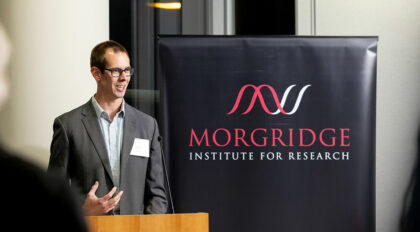
Gitter honored with inaugural Jeanne M. Rowe Chair in Virology
Tony Gitter, a Morgridge investigator in virology and research computing and an associate professor of biostatistics and medical informatics at the University of Wisconsin–Madison, has been named the Jeanne M. Rowe Chair in Virology.

The Pelican Project: Building a universal plug for scientific data-sharing
Morgridge is home to a National Science Foundation initiative to make big data generated by federal research findable, accessible and reusable for all.

Morgridge helping build a multinational bio-imaging community
BioImaging North America, a project housed at the Morgridge Institute, is helping a community of more than 1,200 scientists take their imaging research and technology to new heights.

Fruit fly research is heating up at Morgridge
The increasing impacts of climate change include the effect on fertility as a factor that could decide an organism’s survival or extinction. New research reveals how chronic exposure to warm temperatures affects sperm development in the model organism, Drosophila.
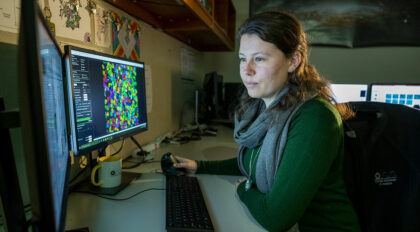
Amani Gillette: An entrepreneur’s journey to improve cancer care
Morgridge Postdoc Amani Gillette discusses her fascinating transition from bench science to entrepreneurship as she steers a new company devoted to improving personalized cancer therapies.

Medical Collaborations at UW–Madison Are Changing Lives
Scientists at the University of Wisconsin–Madison are helping patients achieve better health outcomes by working together.

Searching for the biomechanical risk factors of preterm birth
Morgridge scientists have developed new imaging and engineering tools to better understand the mechanical triggers of preterm birth — a health challenge that affects more than one in 10 pregnancies nationally.

Cryo-EM studies reveal the ‘high-wire act’ of bacterial replication
Genome replication in bacteria frequently breaks down. Scientists at UW–Madison and Morgridge used Cryo-EM to precisely detail how bacterial proteins act like emergency first responders, repairing broken DNA on the fly.
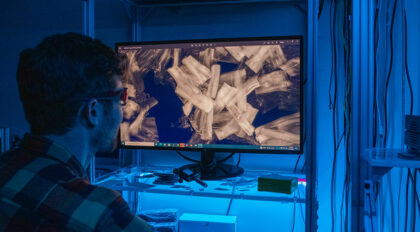
Super-resolution and ultra-deep: New Morgridge scientist pushes limits of imaging
New Morgridge Investigator Randy Bartels develops light microscopy and laser technology to illuminate biology we can't currently see — such as ultra-deep imaging of tissues and large regions of cells.
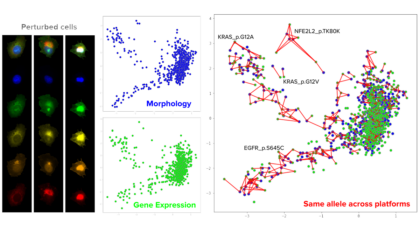
Juan Caicedo joins Morgridge, UW biomedical imaging community
Meet new Morgridge biomedical imaging Investigator Juan Caicedo, who specializes in machine learning to decode complex patterns in human biology.

Winning bioethics cartoon targets publicly restricted research
Five prizes were awarded in the sixth annual Morgridge Institute for Research Ethics Cartooning Competition, which invites participants to make a cartoon on any ethical issue related to biomedical research.
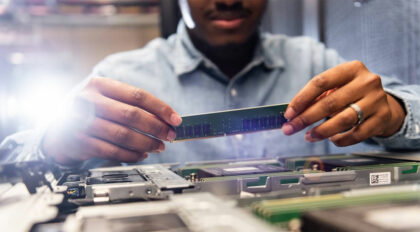
Fire up the GPUs: UW–Madison, Morgridge project sparks next-level computing
A UW 2020 project led by Anthony Gitter has led to a powerful new campus resource for GPU-based computing — the new go-to strategy for complex machine learning research.

‘Deep proteome’ project provides atlas for human complexity
The Josh Coon Lab developed a meta-scale approach to quantifying the human proteome and the massive number of protein variants produced by the human body. Proteomics is a cornerstone of biology and a precursor to understanding how protein dysfunction contributes to disease.
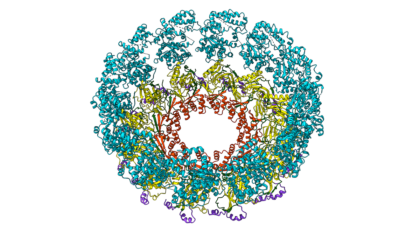
Stunningly detailed blueprint revealed of viral genome replication machinery
Morgridge virologists have outlined in atomic detail the intricate RNA replication machines that coronaviruses create inside infected cells, giving rise to potential new strategies to fight disease.
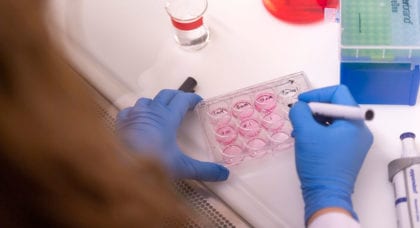
New technology tracks role of macrophages in cancer spread
A Morgridge imaging study of macrophages — immune cells that are important to human health, but paradoxically can help some cancers grow and spread — is offering better ways to understand these cells and target them with immunotherapies.
